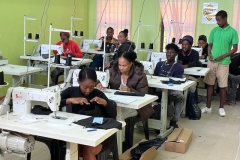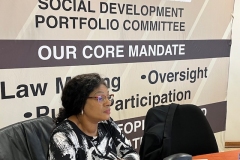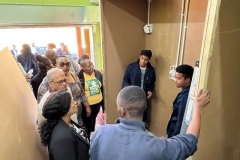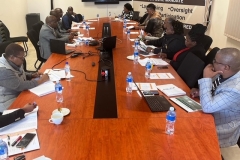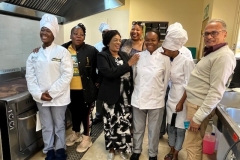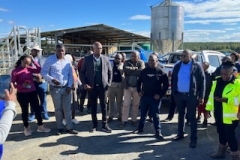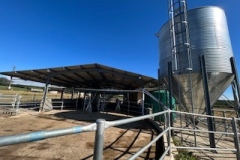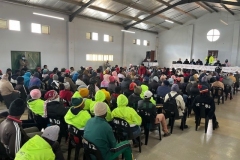BUILDING GENDER-SENSITIVE PARLIAMENTS
Overview and Importance of Gender Sensitive Parliaments
The Sustainable Development Goal (SDG) 5 proposes that full and effective participation and equal opportunities for women in leadership must be ensured at all levels of decision-making in political, economic, and public life. Equally, goal 5, further emphasises the need for the proportion of seats held by women in national parliaments, provincial parliaments and or legislatures and local governments.
However, the CPA statics of women representation still paints a bleak picture in terms of achieving better representation. This does not discount the strides made to ensure that women are included in political participation, for instance in 2001 only 12.4% of women constituted parliaments in Sub-Saharan Africa and by 2019, the figures had grown to 24.1%. Statistics indicate that South Africa is ranked number 4 globally with 44.5% of women parliamentarians in national parliament (Vetten, Makhunga, & Leisegang, 2017). The Parliament of Rwanda still remains a shining beacon of hope in terms of the numbers of women representation, having surpassed the 50% mark by a long shot.
Women’s representation in political, social, and economic decisions is not a nice quota, but it is deeply embedded in the fibres of democracy. In South Africa, the bravery of women birthed the Women’s Charter in 1954. The charter was a declaration by the South African women in their fight for the equal recognition of right and privileges of women in South Africa. The National Council of Provinces has in this 6th term embarked on the review all of this charter, a programmer that was concluded at the beginning of 2022.The Women’s Charter , amongst other things, sought to achieve the following:
• The right to vote and to be elected to all state bodies, without restriction or discrimination.
• Closing of the wage gap between men and women.
• Equal rights with men in relation to property, marriage, and children, and for the removal of all laws and customs that deny women such equal rights.
• To strive for permanent peace throughout the world.
Some of the ideals of the Women’s Charter are still elusive. This is regardless of the fact that even the South African Constitution has provided for them.
The Inter-Parliamentary Report (2014) asserts that political participation is a human right grants citizens the right to participate and further remains central to development and democracy of any nation.
Challenges / barriers faced by women in politics and parliament
There is a need to acknowledge that the political landscape has not drastically changed, women still have to juggle between the unpaid work of raising children and managing households, furthering their studies and contesting political spaces with inadequate financial resource. The leadership positions in political parties are still dominated by males despite the correct political rhetoric. A study conducted by the Inter-Parliamentary Union (2021) on barriers faced by women to enter and participate in parliaments; recognizes that the barriers are deeply rooted in social norms that tend to confine women to certain stereotypical expectations.
Gender Sensitive Parliaments: KZN Legislature Context
Gender-sensitive parliament refers to a parliament that responds to the needs and interests of both men and women in its structures, operations, methods and in its work. Gender-sensitive parliaments remove the barriers to women’s full participation and offer a positive example or model to society at large (Inter-Parliament Union , 2016).
Multilateral organisations such as CPA have further develeped guidelines which are thematized Standards according to the four dimensions of a Gender Sensitive Parliament namely:
• Equality of Participation within Parliament
• Parliamentary Infrastructure
• Parliamentary Culture
• Gender Equality Policy/Women’s substantive representation
Equality of Participation within Parliament
One of the components of this dimension is that women and men participate equally in politics, as candidates for elected office and as elected Members. As well as ensuring that all committees have women and men members; chairpersons are equally divided amongst the sexes; horizontal segregation is not a feature of committee membership or chairing. On equal participation in politics for men and women, South Africa has progressed and is ranked as “one of the most gender-diverse parliaments” across the global rankings.
Adopting the Proportional Representation (PR) electoral system is a catalyst for this progress. A strength of PR is that smaller parties have a chance of winning seats and in this way, ensure the representation of women and a broader range of political views. This is reflected in the 6th administration of the KZN Legislature where women across political parties constitute 49% of Members of the Provincial Legislature. Equal representation is also reflected in Members of the Executive as women contribute 51% of MEC in the Province. It is in the 6th Administration where we have also witnessed the institution having more women chairpersons of Portfolio Committees and as Office Bearers.
Parliamentary Infrastructure
Various factors under this dimension include ensuring that a range of women’s parliamentary bodies are established, such as women’s caucus, women’s committees, and Speaker’s groups. In the KZN Legislature, a multiparty women’s caucus was established in 2008 as an entity through which women parliamentarians are represented and can achieve gender mainstreaming in the interest of gender equality.
Critical to the existence of the Women’s caucus is the continued capacity development programmes, to empower women legislators and enhance their knowledge to be able to participate fully in the legislative processes.
In advancing gender issues, the women’s caucus hosts seminars/ dialogues with various stakeholders in government, the private sector, tertiary institutions, traditional leaders and tertiary institutions. In June, the women’s caucus hosted a successful dialogue series titled “How the Legislature assists its Committees to monitor different departments on whether they implement Gender Responsive Planning Budgeting Monitoring Evaluation and Auditing (GRPBMEA)”. GRPBMEA is a framework geared towards a more sustainable, comprehensive and multi-sectoral approach to gender mainstreaming within the country’s planning, monitoring and evaluation, as well as its public financing systems. The framework recognises that traditional budgeting systems are actively patriarchal and fail to see the contribution of women.
Another advisory, influencing and consultative advisory committee in the KZN Legislature is the Standing Committee on Quality of Life, Status of Women, Children, Youth and Persons with Disability. The committee monitors and evaluates progress in the improvement in the quality of life and status of women, children, youth and disabled persons in the Province, about the implementation of international instruments and applicable legislation.
The Committee in collaboration with government has facilitated dialogues with women farm workers at Emadlangeni and Edumbe to raise awareness against Gender Based Violence in rural areas of Umsinga and Ukuthwala at Ukhahlamba were held.
Parliamentary Culture
Parliamentarians ought to challenge cultural stereotypes and pioneer issues for other vulnerable groups. In this regard, KZN Legislature has championed dialogues advocating for the rights of the LGBTQIA+ and had held successful symposiums with the sector.
Measures towards improvement of women leadership status and equal representation
Notwithstanding the strides that legislatures have made towards building a gender-sensitive parliament, the continued barriers cannot be ignored and require to be confronted.
Parliament and political parties need to continue to place emphasis on mentoring women, fostering their confidence to aim for political leadership positions and putting in place targeted policy solutions through capacity building and creating space for women to participate in leadership positions.
There is a need to continue to rally men for support of creating gender-sensitive parliaments. Ensuring that men are also champions for gender-sensitive parliaments so at to dismantle the inherent patriarchy normalized dominance that men should occupy leadership positions.
Also we need to look closely on how Standing Rules can be improved to ensure that they in no why inhibit on participation of women. The programs of parliaments may also be a barrier to women of child bearing age and those still starting families.
It therefore remains a responsibility of women already in leadership and those who are parliamentarians to come up with innovative means of including all women regardless of age, race or sexuality. This they have to do persuant to the call by one South African woman of many firsts and a pioneer in women political activism, Charlotte Manya Maxeke, when she said “ this work is not about ourselves. Kill that spirit of self and do not live above your people. If you can rise, bring some with you” So, I repeat those of us who are already actively participating in Parliaments must create more opportunities of participation by the women who are younger than us. It is in that understanding that the KwaZulu-Natal Legislature beyond the Women’s Parliament has a direct engagement with women that are below 35 through the Young Women’s Summit. Furthermore, I challenge male parliamentarians to support strategies that can be employed to ensure visible representation of women and reject institutionalizing discrimination and sexism.















